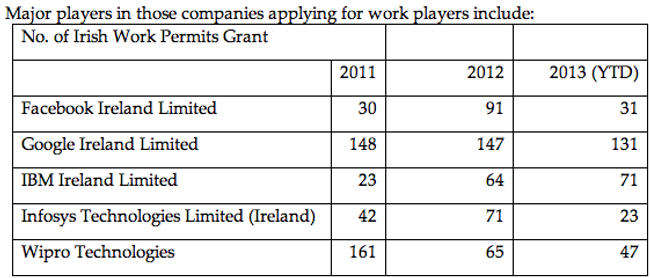Some 4,005 work permits were issued to companies in Ireland that were bringing in skilled professionals from overseas in 2012, down from 5,200 in 2013.
“So far this year, only 3,276 visas were issued despite the Government relaxing bureaucracy in order to alleviate pressure on ICT and life-sciences companies that have invested in Ireland,” according to Visafirst.com.
“There are a variety of reasons for the fall in permits overall – there are more people trained up in Ireland in certain areas of expertise so they are now able to fill positions that only non-nationals could fill a few years ago,” Edwina Shanahan, a migration expert with Visa First explained.
“Also while things are picking up in the capital Dublin, this is unfortunately not the same for the rest of the country so the need for permits is reducing,” she said.

In terms of what sectors are still experiencing skills shortages, Visa First found the science, engineering and technology industry have received more than a third of all permits to date in 2013.
“The figures also reveal that the ICT industry is still leading the board for the numbers of Irish work permit visas issued,” Shanahan said.
“This isn’t surprising because the lack of a qualified workforce in certain IT professions has been well documented and although there have been moves to address this, it will take time.”
Cork is also seeing an increasing share of the work permit grants but at a much smaller scale to Dublin.

Options open to employers
Visa First has listed the options open to employers who need staff from outside the EU to fill skills shortage positions, but said the work permit is the most popular.
The work permit: Generally requires applicants to earn €30,000 but exceptional cases will be considered with a remuneration lower than €30,000, for example, for specialist language support and technical or sales support with a fluency in a non-EEA language for companies with formal support from the State enterprise development agencies. A labour market test needs to be completed to ensure there is no skill set locally available that can do the job. The applicant must process the relevant qualifications, skills or experience that is required for the job. Work Permit Employment Permits are issued for an initial period of two years and can then be renewed.
The R&D Permit: The Irish company who has to recruit individuals for R&D posts can avail of this permit. Family can travel on the permit. Applicant needs a job offer from a company carrying out active R&D projects. The employer must be an accredited organisation for an active researcher. The applying researcher must earn a minimum of €25,000 and €30,000 if they have dependents.
The green card: Applicants must earn €60,000 or more. It is also available to certain occupations earning between €30,000-€60,000, including ICT professionals, professional engineers and technologists, business and financial professionals. The green card is issued initially for two years and allows immediate family reunification and normally a pathway to long-term residence after two years. No labour market test is needed.
The intra-company transfer is a visa option: For those earning more than €40,000 annually. The applicant needs to demonstrate that they were working for the overseas company prior to the transfer. Visas are generally defined for the period of the transfer or for up to two years, but they can be extended. No labour market test is needed, which saves time.
Contract Service Provider Concession Permit: May be issued for work permits to facilitate the transfer of non-EU employees to work on an Irish contract, provided that the employee in question has been working for a minimum period of six months with the overseas company prior to the transfer and that the duration of the transfer is at least 90 days. Applicants must be earning €40,000 or above to remain on overseas payroll.
Business visas: Available for up to 90 days.
Atypical Business visa is for overseas employees who will be coming to Ireland to work on short-term basis between 14 and 90 days, criteria apply.
Irish working holiday visa is open to specific nationalities. Applicants must be under 30 years of age and the visa is valid for one year.




